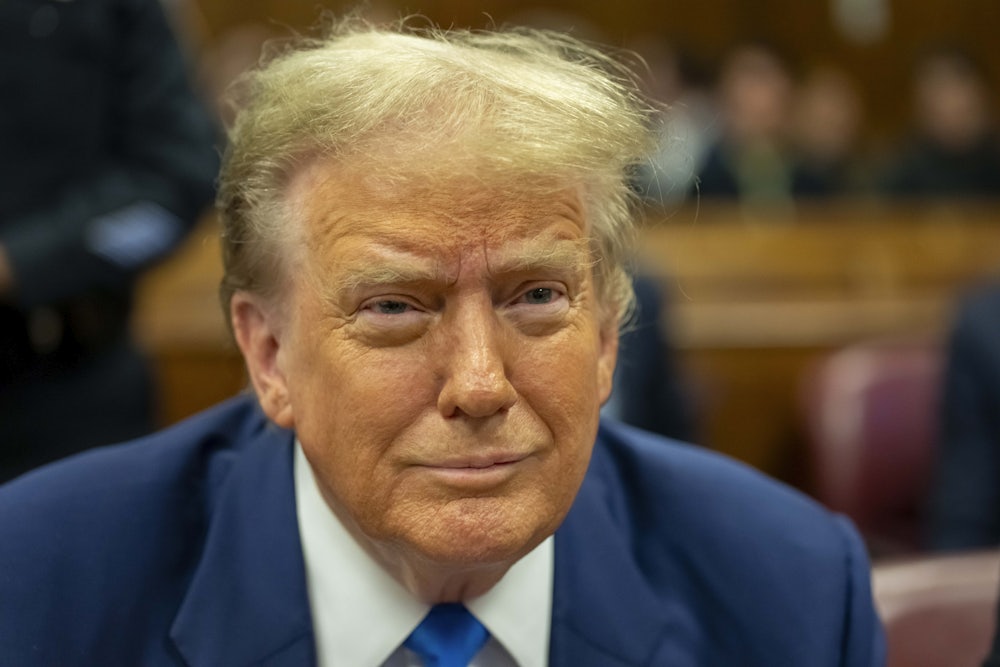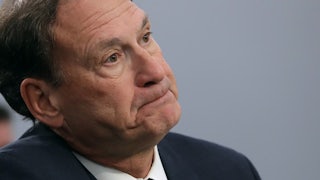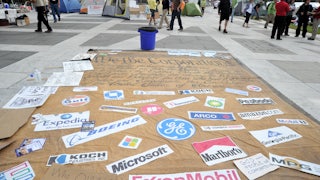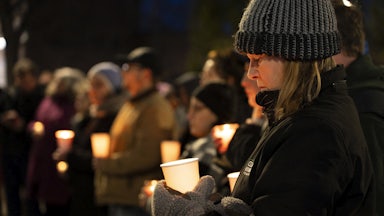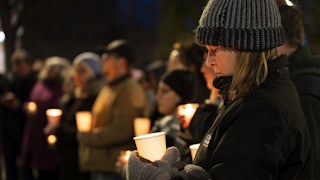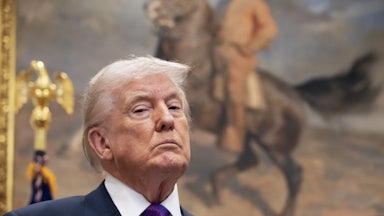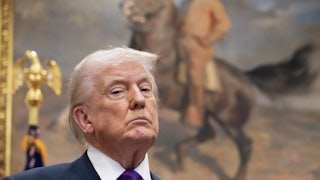Mr. Gag Order was at it again over
the weekend. At a private luncheon Saturday night at Mar-a-Lago, Donald Trump said
Joe Biden was running “a Gestapo administration.” He called Jack Smith a
“fucking asshole” (that was Saturday; then he called for Smith’s arrest on Sunday) and Fulton County District Attorney Fani Willis “a real beauty.”
He lied and lied about the 2020 election. He “bragged about his golf game extensively,
citing tournaments at his own clubs that he ostensibly won,” according to The Washington Post’s account. And, true
to the grifter spirit so central to Trump, he challenged the crowd, who’d paid at
least $40,000 a head to attend, to fork over $1 million on the spot for a
chance to share the stage with him. Two did. One told the crowd, “Donald J.
Trump is the person that God has chosen.”
God has also chosen Trump to spend another week (and then some) in that chilly Manhattan courtroom where 12 of his peers will continue to weigh evidence in the Stormy Daniels hush-money case. The consensus is that last week was bad for Trump’s defense, what with Hope Hicks’s tears and, more importantly, her testimony that Trump knew about attorney Michael Cohen’s payment to Daniels. Writing at CNN, legal analyst Norm Eisen, who was in the courtroom, called it a “devastating blow” and wrote that “the jury ate her words up.”
That was some high drama, but there’s plenty more to come. Daniels is on the prosecution witness list, as is former Playboy model Karen McDougal. Trump, as usual, denies having sex with them. Since it’s pretty obvious who’s telling the truth here and who’s lying, it would seem that these two women can do tremendous damage to his, uh, credibility. They’ll need to be assertive under prosecutors’ questioning and remain poised under cross-examination.
But probably the highest drama of all, at least with respect to determining how the jury decides the case, will come when Cohen takes the stand. The prosecution is being tight-lipped about who is going to testify when, but this should all be happening soon.
Cohen is the witness best positioned to tell the jury definitively that yes, he made the payment at Trump’s direction and that it was clear that the payment was made to preserve Trump’s chances to win the election. When he takes the stand, he’ll be doing so from a starting point of pretty low credibility. He’s a confessed and convicted liar who served prison time. He hasn’t really helped his cause lately by tweeting about Donald “VonShitzInPantz,” funny as it may be. (Cohen said last week he’ll stop that.)
But given that the outcome of the election may hinge to a considerable extent on whether Trump is convicted or acquitted by this jury, it’s vital that the prosecution do everything it can to maximize Cohen’s credibility. That means, perhaps paradoxically, bringing out all the bad stuff themselves and getting it out of the way.
It’s an old belief among prosecutors that jurors should hear the bad things about their star witnesses from them. As former federal prosecutor Robert Katzberg told The Washington Post last week: “Prosecutors guard their credibility with the jury by bringing out all the bad stuff on direct examination. A prosecutor never wants to be seen by the jury as hiding something from them.”
Cohen definitely has a story to tell here. He’s told it in his book, on his podcast, and in numerous television appearances. Yes, he spent years lying and fixing for Trump. Yes, he did bad things, things he’s ashamed of. But once he saw what kind of president Trump was, he changed and came clean. He started cooperating with prosecutors. He’s reported to have spent more than 50 hours talking to investigators for special counsel Robert Mueller’s Trump investigation, and he did so without a formal cooperation agreement, a standard measure that cooperating witnesses take in such situations to immunize themselves. He’s become a regular voice in the anti-Trump conversation (and, I should note, he participated in TNR’s Stop Trump Summit in Manhattan last October, interviewed on stage by the veteran journalist Jonathan Alter).
MSNBC is one thing. A courtroom is another. Trump’s lawyers will try to destroy him. That’s why it’ll be smart for the prosecutors to hang all the dirty laundry out there first, so that when the defense starts asking its questions, no big and ugly revelations will emerge. And then he’ll need to be persuasive on the key questions: that he is sincere and repentant; and that Trump knew about the Daniels payment and that it was motivated by electability concerns. Given what Cohen himself has told us many times about the Godfather-y way Trump talks in grunts and suggestions and signals, there is likely no hot smoking gun. That makes Cohen’s personal believability all the more crucial.
It should be noted that there’s a long history in U.S. jurisprudence, and in New York jurisprudence in particular, of juries believing star witnesses who’ve flipped. The most famous is probably Sammy “The Bull” Gravano. His crimes make Cohen’s seem like Cohen stole the bake-sale proceeds for the marching band uniform drive. Yet the jury took Gravano’s testimony seriously and convicted John Gotti and other associates in part because of it.
Gravano was hardly sincere in his repentance, either. He just wanted a deal. And the government wanted Gotti, and it got a jury that was evidently tired of Gotti getting away with everything too. We have no idea how this jury feels about Donald Trump. It will fall on Cohen—and Daniels and McDougal and the prosecutors—to convince the jurors that Trump is the liar here. We must hope that the guy who stopped lying for his boss six years ago can do that.
